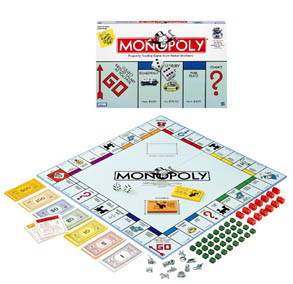
|
About OgreCave and its staff
|

|
by Demian Katz
This review is part of OgreCave's Gaming 101 course. Pay attention - there will be a quiz. Maybe.
Monopoly is the real-estate trading game that, for many people, is the definitive board game.
How it works The interesting thing about Monopoly is that, while everybody knows the essence of the rules, few people play by all the details. For example, it's very common for all taxes and penalties to be played to the middle of the board and won by landing on the Free Parking space, but this is not in the rules at all - the Free Parking space has no special purpose in the game, and playing this variant just makes an already long game even longer. Many people are unaware that if a player lands on an empty property and chooses not to buy it, it immediately gets auctioned to the highest bidder by the banker. The rules and regulations of player interaction (an important part of the game) are also frequently ignored, sometimes leading to an exceedingly boring or chaotic experience. Of course, it's not just players who bend the rules. In recognition of the fact that the game tends to take hours to complete, newer editions have included optional variant rules to speed things up, either by pre-designating a stop time, or by having players start the game already owning random portfolios of real estate.
Why you should know this game Monopoly certainly has some things going for it. It probably deserves some credit for the heavy emphasis on theme in American game design, since there's no mistaking what the game is about. The play money and property deeds give a satisfying physical reality to what the game is simulating. This, combined with the random suspense of the Chance and Community Chest cards, accounts for a lot of the appeal of the game to younger players. For adults, the need for negotiation and plotting to actually reach the endgame is the main reason to play. In spite of its good points, though, it's a little hard to understand the game's longevity. You'll find a lot more vocal Monopoly-haters than you will find fans, and it's hard to blame them. At its core, the game feels broken. Once all the properties are sold, the thrill of movement turns into the dread of constant punishment. Although the winner is often effectively determined early on by lucky property purchasing, it takes hours of senseless back-and-forth to actually reach this foregone conclusion. As players go bankrupt and get knocked out of the game, they're forced to watch passively as everyone else continues, sometimes for hours longer. Surprise upsets are more likely to occur due to somebody folding from boredom and frustration than from cunning play. There are quite a few lessons in all of this. Player elimination is bad, especially in a long game (why not give bankrupt players something to do?). Games about resource acquisition aren't very interesting after all the resources are in play unless there's some real motivation for them to change hands later on. Starting off casual gamers with a game that lasts multiple hours is probably not the best way to convince them to take up the hobby. This last lesson seems to be the only one that the publishers of Monopoly have taken to heart, but it's also the least important: a shorter broken game is still broken. Still, with a little love, an interesting game can still be salvaged from here. If you have to play this one, perhaps you should play it with that thought in mind; after all, people have been happily breaking the rules of Monopoly for decades already.
|
||||
 Monopoly
Monopoly Monopoly is important mainly because it is so ubiquitous. Variations
and rip-offs exist for nearly every theme and clutter gift shops and
department stores of all sorts. Anybody can recognize it, and for many
people, it's the first thing that comes to mind when the phrase "board
game" is mentioned. Understanding Monopoly is part of the key to
understanding why people are attracted to (or repelled from) the gaming
hobby.
Monopoly is important mainly because it is so ubiquitous. Variations
and rip-offs exist for nearly every theme and clutter gift shops and
department stores of all sorts. Anybody can recognize it, and for many
people, it's the first thing that comes to mind when the phrase "board
game" is mentioned. Understanding Monopoly is part of the key to
understanding why people are attracted to (or repelled from) the gaming
hobby.